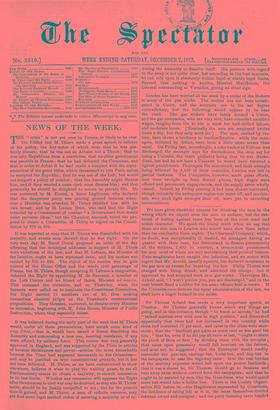It was believed during the early part of the week
that M. Thiers would, under all these provocations, have struck some kind of coup d'état,—that is, would have issued a decree dissolving the Assembly and summoning a new one, meeting resistance, if any were offered, by military force. This course was very generally approved in England, and was supported by the Times in articles of unusual decisiveness and power—articles the more remarkable because the Times had appeared favourable to the Orleanists- and may be justified on true constitutional grounds, but it has not been followed. M. Thiers, as we have endeavoured to show elsewhere, believes it wiser to play the waiting game, to use all Parliamentary means to obtain a majority, to stretch concession to its last limits. Whether any concession will appease the Right after its summons to civil war may be doubted, as may also M. Thiers' nerve, should be be finally compelled to act ; but for the present time is gained, and M. Thiers, a man of infinite resource, may yet find some legal method either of securing a majority or of in-
clueing the Assembly to dissolve itself. His position with regard to the army is not quite clear, but according to the beat accounts, he can rely upon it absolutely within legal or visibly legal limits. Beyond that nothing is known, Marshal MacMahon, the General commanding at Versailles, giving no other sign.


































